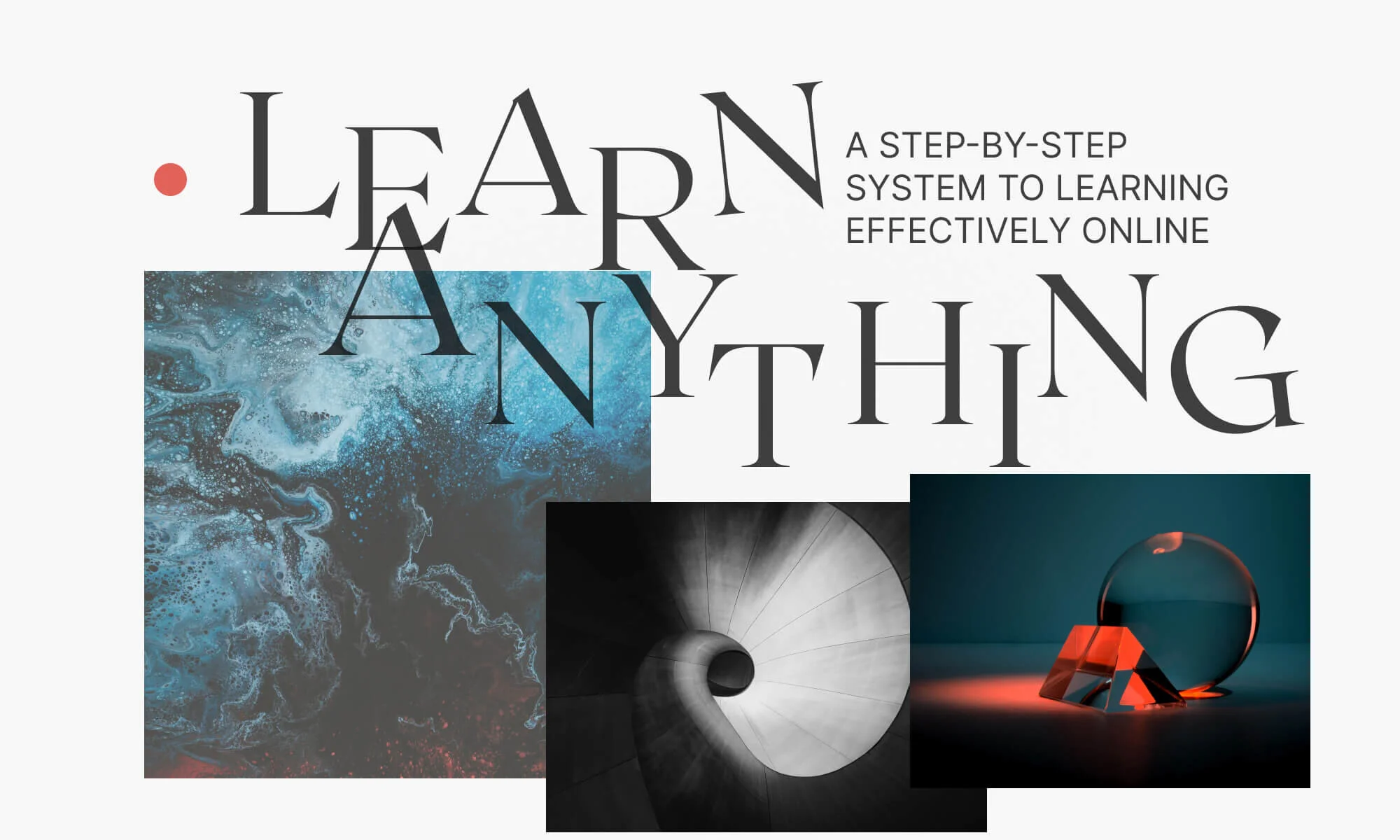How to Learn Anything on the Internet: A Step-by-Step System
We Have Control Over the Content We Consume
This belief may sound obvious. I do not think it is so obvious in the depth it entails. We have control over the content we consume. We may feel powerless and aimlessly influenced by external forces ruling our lives at a subconscious level. But there is value in personal responsibility. We are capable of more good than we can imagine, I would argue. Our limiting beliefs and competing commitments may be holding us back from achieving our potential. But what we believe is, to a great extent, under our control. Life seems to contain inherent pain, but there is a space between what happens to us and how we react to external events: in that moment there is a choice, and in that decision, there is our potential manifesting itself in front of us. This is also valid for content consumption—the core topic of this article: we can apply mindful control over what we consume, and how, and why, and what we do with that content. Although "algorithms" may have a crucial influence on how the internet works, human beings, and our consciousness can overrule that.
I have been fascinated by the potential for deep (and broad, for that matter) learning there is on YouTube in particular, and the Internet more in general. In this essay, I would like to present a step-by-step approach to learning content online (and especially on YouTube). This method contains psychological and practical steps one would need to follow mindfully should they want to tap into the potential of learning online. What is written in the first paragraph of this article is in and of itself the very first step toward unlocking the potential of learning online: we can consciously and fully resolve to have control over what we consume, and in what quantity, and through which method.
Let the algorithms work for you, not against you. By watching high-value, instructional content, you can shape the algorithm around you
We can make the YouTube algorithm "work for us." With this statement, I am not implying deep knowledge of how the algorithm works. The YouTube algorithm, similarly to other social media algorithms, seems to suggest content that has some degree of similarity (whatever the shade of it) to the type of content you are currently watching. My proposition here is rather simple: watch high-value, growth-related, evidence-based content, and more of it will be suggested to you. That is a good first step to separating the wheat from the chaff.
I would define high-value content as the type of information that has a degree of educational nature, utilizing an evidence-based (scientific) approach to exploring and presenting arguments. Only watching such type of content is the first crucial step in the process of adding clarity to your learning journey. But that is not enough, in my view. There is the danger of falling prey to an echo chamber, especially if you are interested in content that has some sort of political nature to it. Consuming political content is not a great idea, in my estimation. The highest-value content you can find online is the one with an objective, unbiased, evidence-based approach to the truth, as I pointed out above. Intentionally consuming content about politics from a philosophical aspect can be enriching too.
Always keep an open mind. Seek contrarian information to your point of view and tendencies. "Pay attention, and be a good person. "
The antidote to falling prey to echo chambers and close-minded beliefs is open-mindedness. Being part of a close group may feel great from an evolutionary perspective. Pay close attention to that. Splitting the world in "us vs them" is a terrible idea, as far as I am concerned. You are capable of evil—each of us is capable of evil. But we are also capable of good. And we can consciously pick our condition. Expose yourself to information that is equally valuable but provokes emotionally strong reactions in you. Ask yourself: why? Such type of exposure is immensely useful. If something makes you feel angry, frustrated, resentful, cynical, pay close attention to your reactions, reflect on them, resolve them.
You may have deeply-engrained competing commitments lurking in the background for years. Keeping an open mind means exactly that: be sufficiently introspective to catch your inherent biases, fixed beliefs, faulty mental models. If you notice an excessive exposure to only one part of an argument, proactively and attentively seeking contrarian information is a good idea, I would argue. This makes you open-minded. There is an example in the fitness community: "bro-science" vs. "evidence-based fitness." If you find yourself leaning into one of those two groups and you have not even tried to understand the beliefs behind the "other faction," ask yourself "why?" Sometimes, we avoid exposure to things because they feel frightening. We identify with the individuality we decided to pick, at some point in the past, and fear stepping out of our close circle of knowledge. That is dangerous. It is ok to have solid mental models guiding our daily decisions (else, how would we navigate life speedily and smoothly?). It is not acceptable to not even consider contrarian beliefs to ours merely for fear that there is some truth in the other party, and that that would hurt our sense of identity.
Set up a centralized system for knowledge management
Capturing the most valuable content you consume is pivotal. Taking notes adds a lot of value to it, integrating the new information in your mind and forming novel connections. The ability to link related content for quick reference can be a superpower that unlocks creativity (uniting the "dots" from seemingly unrelated fields). That can make us more profound human beings with "something to add to the table." I wrote this post some time ago on building and using a centralized personal knowledge management system in Notion. Here are, in brief, the pillars for a centralized knowledge management system:
Build a central database to quickly capture, store, take notes on, review essential information (some tools you may use include Notion, Obsidian, Coda, Roam Research)
Only capture the most essential content you consume that makes you learn something and resonates a lot
Organize content by topic for easy research and referencing (e.g., using tags in a Notion database)
Take useful notes (what is it that made you save this content? Why does this thing resonate with you? How can you apply this concept to your life? What are the key concepts shared in the content? etc.)
Have a review system in place (maybe you can negotiate with yourself to review the content saved as part of your weekly review/monthly review session). Do not let the information processed get lost in the abyss of memory
Maintain the system carefully and with close attention. Don't forget your why.
Keep a writing practice
Writing about what you learn allows you to reflect deeply on the information you consume, making it "yours." Writing also allows you to think about relations between seemingly distant topics, which breeds breakthroughs. You can write publicly, as author Austin Kleon would suggest. Or you can keep your writing for yourself. Both approaches are fine, although publishing your work may foster motivation and careful attention to what you publish (increasing awareness of details).
Concepts and ideas feel like becoming real when you write about them. They get defined and reflected upon with precision and deep thinking. Being able to write—a skill that you may acquire after writing consistently and deliberately for a long time—can be a super skill in society and the world of work. It can unlock our ability to communicate and hone it. Being able to articulate our thoughts effectively is empowering and somewhat rare, I would posit. It is empowering because when you know how to write you also improve your capacity to speak and compellingly define "things" that happen around you. The ability to communicate effectively, both in written and spoken form, is crucial for leadership too.
I have been learning from YouTube (and the internet more broadly) for numerous years now. Oftentimes, it seems that mere illustration of an argument is not enough to "make it stick." Anecdotal narrations appear to be found more interesting and convincing by a significant portion of the population, despite their "anecdotal" nature. This may have to do with evolutionary psychology and our human attraction to stories. Stories attract us because they demonstrate what's achievable, especially if they contain a hero's journey embedded in them.
So, I decided to insert a personal story, learning a skill, that was born out of my following a rigorous process of disciplined learning on YouTube and the internet: becoming a certified Notion consultant. I am twenty-two years old when I get this "prize" after some months of hard work and persistence building Notion systems. Notion is the "all-in-one workspace for teams and individuals." It is a technological tool whose flexibility is one of a kind. It allows building any kind of system (although it certainly has its limitations as a tool) crafted around the user.
I discovered Notion on YouTube, a bit more than two years ago at the time of writing. This tool attracted my attention like no other. I started to play around with it and kept learning consistently through practice and instructional videos/articles. From a casual user, I turned myself into an avid "content creator" around the platform, building templates and systems for individuals to use. In the meantime, I developed a concise knowledge management system in Notion itself, where I captured all the most enriching information I consumed. After about one year of building templates, I ventured into collaborating with businesses to build Notion systems that work for them. I had a clear horizon in mind: becoming a certified Notion consultant.
This recognition may seem, to the eyes of most people, just another "internet certification" in the incredibly vast world of technological tools. But to me, for some reason that may be related to the high respect I developed toward the people in the Notion ecosystem and the value of the tool itself, one of the most important north stars driving my existence during a certain period. I got the certification after building up some experience in the "real world of work." This felt amazing, although hedonic adaptation kicked in rather quickly, as it often happens in life.
Most of what I have learned to become a certified Notion consultant came from YouTube and the internet. This has now become a job for me: collaborating with organizations and individuals to build centralized systems in Notion and minimize hyperactive hive-mind behavior.
Thank you for reading. If you found this article valuable, consider checking out the Weekly Reflection, a once-a-week intentional newsletter around the deep life.

